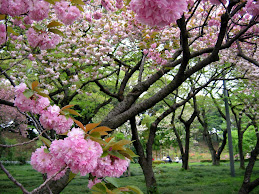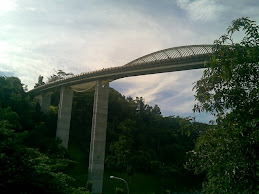By Danson Cheong, The Straits Times, Monday, 21 December 2015
PHOTO: Zaibike's fleet manager Chok Xin Lin (left), 21, and its CEO Lee Jun Xiang, 23, riding on campus on two of their nine bicycles available for rent.
Photo: The Straits Times
https://blogger.googleusercontent.com/img/b/R29vZ2xl/AVvXsEhrZOOKtKzYPNOY2pgwQXrryl8oG4_ncGwHcMDRXvUTNm5G4hJCv0E8SqJaN2NHJPtJu1QsKj07D-hTFGvrZdI0z6VDjyNv0gJyWW1Exc86_XxlqhyyZ7MdQknCmWtEAhkQ5-0D62u81zw/s1600/20152112_Zaibike.jpg
http://transport.asiaone.com/sites/default/files/styles/article_image/public/original_images/Dec2015/20152112_Zaibike.jpg
http://transport.asiaone.com/news/general/story/tired-hikes-students-share-bikes
It takes 15 minutes to walk the 1km from the Expo MRT station to the Singapore University of Technology and Design (SUTD).
There are no shuttle buses to campus, and the unsheltered walk is hot, sweaty and uncomfortable.
Fed up with the trek, a group of final-year SUTD students launched trials last month for a bicycle-sharing programme that will allow students to rent a bike at the MRT station and ride to campus.
"I've always cycled to and from the station, and it takes only five minutes," said information systems undergraduate Lee Jun Xiang, 23, who lives on campus.
He helms ZaiBike, a bike-sharing scheme two years in the making, which he runs with eight other final-year students at the university.
The users scan a QR code on the bike with their smartphone, which gives them a security code to unlock the bike with. After they ride to campus, they can lock the bike at any of seven racks there.
Users get the first hour of rental free, but they have to pay 50 cents for each half-hour after that.
The scheme comes as the Government is preparing to launch its own bike-sharing pilots in the Jurong Lake District and Marina Bay, expected by the end of the year.
But ZaiBike differs from other bike-sharing models in that specialised docking stations - that lock and rent out the bikes - are not needed.
"Pavement space is very limited here, so we wanted to adapt our bikes to existing racks instead," said Mr Lee, adding that costs can also be kept low without heavy investment in infrastructure.
The group has received a $20,000 grant from the university's research and development centre, and is trying to raise money to buy 30 custom bicycles.
Mr Lee said his team is in the process of designing a modular device that will be able to track the bicycles, lock them and deter would-be thieves.
A prototype of this device - which will eventually be installed on all the bikes - should be completed by the middle of next year.
For now, the team has only nine bikes, mostly borrowed from their friends, which are secured with combination cable locks.
Even so, response to the pilot has been positive. "It's very convenient for that last-mile to school. Even though the bikes are quite old now, I think this has a lot of potential," said engineering systems undergrad Kenny Raditia, 22.
He is one of the programme's 75 active users, out of a student population of about 900.
Mr Lee hopes to double the number of users when the programme is officially launched in the middle of next year. "We want to provide about 10 bikes for every 60 users," he said.
SUTD Assistant Professor Lynette Cheah said ZaiBike offers its users flexibility as "it is not constrained to docking stations".
But she noted that fleet balancing, or making sure that bikes are well-distributed to meet demand at various locations, could be a challenge when the project is scaled up.
Dr Alexander Erath, a transport researcher at the Singapore-ETH Future Cities Laboratory, felt that the group should also make bicycles available at locations with high demand such as train stations.
He pointed to German railway company Deutsche Bahn's Call a Bike programme, which follows a similar model.
"You would need some measures to redistribute bikes based on demand (through the network)," he said. "But you would also want to ensure there are a certain number of bikes available at train stations - so when people arrive, they don't need to search for a bicycle, but can just grab one and go."

PHOTO: The story of leaving the business world to spend a year with the American Red Cross in Washington, D.C. as a Fulbright scholar.
Picture posted by Miss with a Mission on 18 January 2015
https://blogger.googleusercontent.com/img/b/R29vZ2xl/AVvXsEifZichWHwBf2RA2FQFgpPhAyXxoCc1-6QCv8GBLvjdqxEodhjaYTKzEFqwlBfLpsGRBXJhpetWgHi7dVQrbmfV4KillQ7Xvp9M_LaRXdlTF0slgPZgdq7S82JJl5tYTLTSpSnQkUMFw8I/s1600/p1060575.jpg
https://misswithamission.files.wordpress.com/2015/01/p1060575.jpg
https://misswithamission.wordpress.com/
Reference
- https://blogger.googleusercontent.com/img/b/R29vZ2xl/AVvXsEhrZOOKtKzYPNOY2pgwQXrryl8oG4_ncGwHcMDRXvUTNm5G4hJCv0E8SqJaN2NHJPtJu1QsKj07D-hTFGvrZdI0z6VDjyNv0gJyWW1Exc86_XxlqhyyZ7MdQknCmWtEAhkQ5-0D62u81zw/s1600/20152112_Zaibike.jpg
- http://transport.asiaone.com/sites/default/files/styles/article_image/public/original_images/Dec2015/20152112_Zaibike.jpg
- http://transport.asiaone.com/news/general/story/tired-hikes-students-share-bikes
- https://blogger.googleusercontent.com/img/b/R29vZ2xl/AVvXsEifZichWHwBf2RA2FQFgpPhAyXxoCc1-6QCv8GBLvjdqxEodhjaYTKzEFqwlBfLpsGRBXJhpetWgHi7dVQrbmfV4KillQ7Xvp9M_LaRXdlTF0slgPZgdq7S82JJl5tYTLTSpSnQkUMFw8I/s1600/p1060575.jpg
- https://misswithamission.files.wordpress.com/2015/01/p1060575.jpg
- https://misswithamission.wordpress.com/




































.jpg)
.gif)
.jpg)
























































